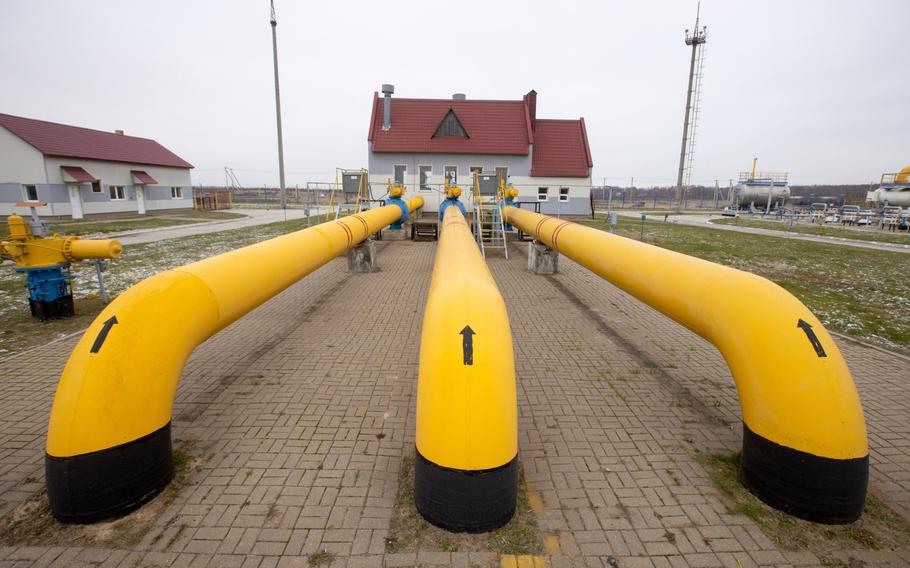Europe
Europe faces harsh reality of finding Russian gas irreplaceable
Bloomberg February 2, 2022

Pipework showing flow direction at the Kasimovskoye underground gas storage facility, operated by Gazprom, in Kasimov, Russia, on Nov. 17, 2021. (Andrey Rudakov/Bloomberg )
Energy-rich countries from Qatar to Azerbaijan have all pledged emergency gas supplies to Europe, but the region is quickly figuring out it can't replace top supplier Russia.
Ongoing tensions over Ukraine and the threat of a potential conflict interrupting energy flows to Europe have overshadowed the continent's gas market in recent weeks, causing volatile price swings. War could interfere with the massive volumes that Russia sends to the continent, about a third of which come through Ukraine.
To mitigate the risk of supply disruption, the European Union is speaking with major producers, seeking partnerships and even potential fuel swaps with Asia, where the market is twice the size of the bloc's. Recent arrivals of liquefied natural gas have helped to ease tightness, as has mild weather, but Europe relies on Russia for more than a third of the gas it uses, and sourcing that fuel from elsewhere could spread the crisis to other regions.
"Europe has no alternative to Russian gas," said BCS Global Markets Senior Analyst Ron Smith. "You would have to divert half of the LNG that Asia consumes in order to replace Gazprom. And what would that mean? That would mean massive energy shortages all across Asia, you would export Europe's energy crisis to Asia."
The volume of gas the EU needs can't be replaced by any one supplier unilaterally without disturbing deliveries to other regions, Qatar's energy minister Saad Al-Kaabi said Tuesday after a call with the bloc's Commissioner for Energy Kadri Simson.
He added that Doha's supply contracts are "sacrosanct in Qatar," and the nation's priority is to fulfill the needs of its existing customers first. Guaranteeing Europe's energy security will require a collective effort from a number of different suppliers, he said.
For any prolonged disruption lasting through next two winters, Europe would have to curb demand, researchers at the Brussels-based Bruegel think tank said in a blog. And that uncertainty is likely to keep prices high as competition for LNG intensifies.
"As long as the situation in Ukraine is unclear and unresolved, European buyers will be willing to pay enough to attract flexible LNG cargoes to make sure inventories do not run dry," said Oystein Kalleklev, chief executive officer of LNG shipowner Flex LNG Ltd.
Because gas infrastructure is expensive, most of the world's volumes are typically sold under long-term contracts between sellers and buyers. Flexible deliveries from the U.S. could help, but only if the price is right.
The U.S. was the biggest LNG supplier to Europe last month and, together with other nations, helped displace Russian gas supply by a few percentage points in January, according to senior European Commission officials.
But that isn't guaranteed to last. Europe has been the most profitable region to send the super-chilled fuel to since the end of last year but usually it's Asia, the world's fastest-growing market. If China's appetite for gas re-awakens, tankers will be quick to abandon Europe and head eastward.
Meanwhile, Gazprom's daily gas exports via pipeline plunged to its most important markets in January, to the lowest since early 2015, despite the company producing more of the fuel.
On the EU's radar is also Azerbaijan, the Caspian nation that started sending gas to Europe at the end of 2020. Its deliveries to Europe, Turkey and Georgia are about a 10th of volumes Gazprom sells to its main export markets, and that supply was pre-sold almost a decade ago to help finance production and pipelines.
"Reality is Azerbaijan is not a competitor to Russian gas simply because of the volumes," Elin Suleymanov, the nation's ambassador to the U.K., said in an interview last week. "We could help with some deliveries but Azerbaijan volumes are not equal to the Russian volumes, that's obvious. That's something which also needs to be thought of by our Western partners."
For now, Europe relies on the LNG that's been arriving at its shores, helping to ease high prices. By May, Asia is set to regain its spot as a premium export market for U.S. cargoes of the fuel, according to BloombergNEF calculations.
"This idea that 'we will fill the gap with LNG', no, you can't. It's physically impossible to do, there's not enough LNG in the world to do that," Smith said.
___
Bloomberg's Dana Khraiche, Elena Mazneva and Ewa Krukowska contributed to this report.